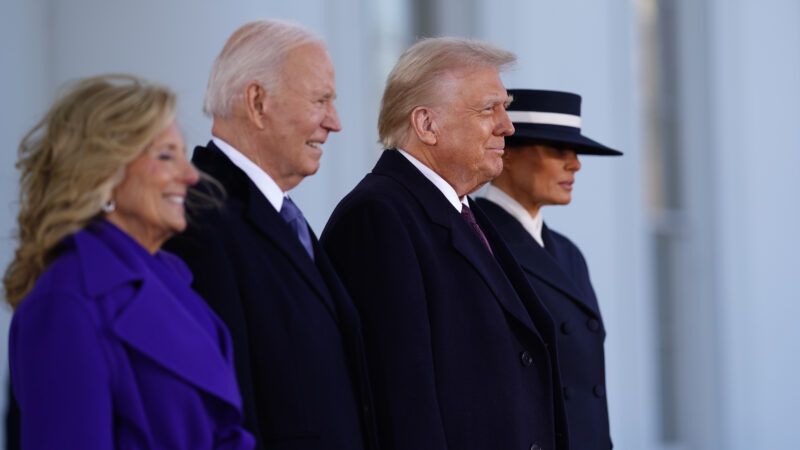Trump Pledges To Revoke E.V. Mandate in Direct Repudiation of Biden's Platform
Trump may not be able to revoke the rules outright, but polls show that most Americans don't support a mandate.

On Monday afternoon, President Donald Trump was sworn in for his second term as outgoing President Joe Biden looked on. In his inaugural address, Trump laid out a number of policies for his first day that would effectively undo as much of his predecessor's legacy as possible, including on green energy.
"Today I will sign a series of historic executive orders," Trump announced, which he said would spark "the complete restoration of America and the revolution of common sense." Alongside declaring a national emergency at the U.S.–Mexico border, Trump said he would declare a "national energy emergency" and double down on the production of oil and gas, which he called "that liquid gold under our feet." (Notably, the government issued more onshore drilling permits under Biden than during Trump's first term.)
"With my actions today," Trump continued, "we will revoke the electric vehicle mandate, saving our auto industry and keeping my sacred pledge to our great auto workers. In other words, you'll be able to buy the car of your choice."
Unlike many of Trump's pledges, he may have the power to accomplish this. The electric vehicle (E.V.) mandate stems from rules adopted in 2024 by the Environmental Protection Agency (EPA) that set acceptable levels of tailpipe emissions. The regulations would effectively require 56 percent of all new vehicles sold in the United States by 2032 to be powered by electricity alone, with fewer than 30 percent using gasoline.
As president, Trump could appoint an EPA administrator who would pursue an alteration or outright repeal of those rules. In a Senate hearing last week, Trump's pick to head the agency, former U.S. Rep. Lee Zeldin (R–N.Y.), declined to say whether he would roll back the E.V. mandate, telling senators that "I am not allowed to prejudge outcomes going into rulemaking."
Still, it's possible that Trump and Zeldin could be stuck with Biden's rules. Any revocation must follow the process set out in the Administrative Procedures Act (APA), the 1946 law establishing how federal agencies make and enforce rules. During his first term, Trump ended an immigration program enacted by his predecessor, Barack Obama; the Supreme Court later reversed it, ruling that while he had the authority to do so, his revocation had not followed the APA.
As a matter of policy, ending the E.V. mandate is not a bad thing: The EPA rules effectively prioritized fully electric vehicles over hybrids, even though demand shows that Americans are more comfortable with hybrids that use less gasoline but can take long trips without being completely dependent on public charging stations. Polls show that while generally receptive to E.V.s, the public largely opposes a mandate.
True, climate change is a real problem that needs to be addressed. But mandating the use of one particular technology over another is an overreach of federal authority.
Besides, markets are more effective at developing technologies that people will adopt, rather than simply mandating whatever is in vogue at the time.
Much of Trump's Day One Agenda was devoted to simply unwinding his predecessor's policies. But simply on a policy level, revoking the E.V. mandate and allowing the market to decide the most effective method of addressing climate change, is a positive step.


Show Comments (19)